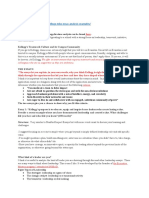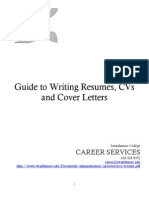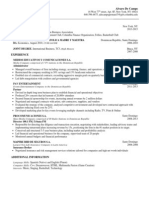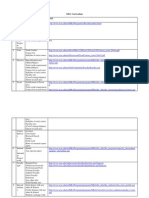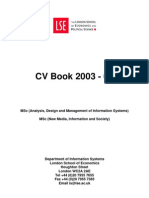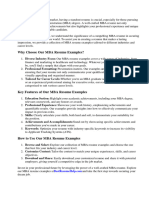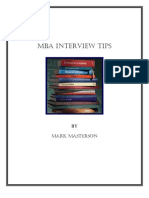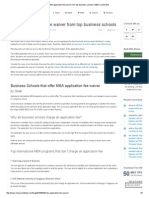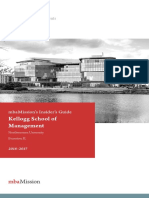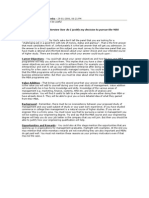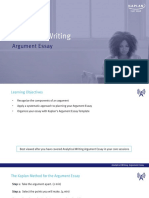Essays - Way To Stand Out For Engg
Essays - Way To Stand Out For Engg
Uploaded by
Ranish BeraCopyright:
Available Formats
Essays - Way To Stand Out For Engg
Essays - Way To Stand Out For Engg
Uploaded by
Ranish BeraOriginal Title
Copyright
Available Formats
Share this document
Did you find this document useful?
Is this content inappropriate?
Copyright:
Available Formats
Essays - Way To Stand Out For Engg
Essays - Way To Stand Out For Engg
Uploaded by
Ranish BeraCopyright:
Available Formats
Way to Stand Out 1: Present yourself as an outstanding leader with strong business and teamwork skills A classic mistake
that many engineers and techies make is that they present essays, a resume and recommendations that portray them as tech specialists, not as business persons or leaders. There is a very big difference between presenting yourself as a techie and presenting yourself as a business person who happens to be in the technology or engineering field. You want to do the latter! When you write essays that recount your work experience, and especially when you write any essay specifically about leadership, tone down the tech talk and tone up the content that focuses on the leadership practices you have learned and employed. Indeed, a key reason why some engineers and techies have great success in admission to top MBA programs is because they are able to demonstrate through their application materials how they have put into practices great leadership skills such as setting goals, mentoring team members, managing conflict, developing clients, etc. This is the information that is business relevant, and this is the information that you and your recommendation writers should stress. If you have helped manage very diverse teams, this is an asset you should draw attention to. If you have experience helping to lead international teams or cross-functional teams, shine a light on this. Think of it this way: your non-tech classmates will not benefit most from hearing about the technical skills you employed to produce a new product or increase the efficiency of some production system. Rather, they will most benefit from learning what business thinking and leadership practices helped you achieve success in the workplace. Your focus in your essays on leadership and business-relevant skills helps to convey information that can lead the admissions committee to believe you will be able to make valuable contributions to discussions in their MBA program.
Way to Stand Out 2: Demonstrate you are the best among your peers and among other leaders Above, I talked about presenting yourself as a leader and business person. A second important thing to do is to demonstrate you are the very best among your peers and among other leaders. You should strive to move beyond presenting yourself as a relative high performer to creating a situation in which the admissions committee perceives you as truly distinguished in the workplace with great leadership skills and leadership potential. Business schools like this because they will perceive you as someone who has achieved excellence and can bring that excellence into their classroom; they will also perceive you as someone who is likely to emerge as a person of influence in your career. Top business schools want to believe they are grooming the next generation of industry leaders.
Way to Stand Out 3: Present compelling long-term goals
The vast majority of applications ask about your long-term goals. You need to have an attractive, compelling answer. Often, many candidates come to my company, MBA Admit.com, and ask us to review the applications they had prepared on their own, which failed to gain them admission to top business schools. In many cases, a big key contributing factor to the rejection was the long-term goal that the candidate presented. Take time to think about what you truly want to do as a long-term career goal. Develop those ideas. There are some guidelines that can help you use the long-term goal as a factor that helps you to stand out and makes you highly appealing as a candidate.
First, is your long-term goal clear? While this is not a hard-and-fast rule, I generally advise that you shouldnt give two different alternatives of the long-term goal you might want to pursue. Many candidates are unsure about what they want to do in the long term, but you want to sound fairly directed when you apply to business schools. Presenting two goals can be risky, as many admissions committees want to hear more certainty.
Second, make sure your career goal helps to distinguish you. Often, this is a matter of detail: that is, you should provide sufficient detail. The more the committee can envision your long-term goal, the more compelling your candidacy might be. For example, many tech and engineering candidates indicate that in the long term, they want to run their own IT company or manufacturing company. Without providing good definition to this goal, this will sound very common. It will be perceived as nearly indistinguishable from countless other candidates with similar backgrounds. I believe one reason why at MBA Admit.com we have seen such success with our candidates who come from engineering and tech backgrounds is because we have helped our candidates to present their longterm goals in ways that help them to stand out. Instead of simply stating you want to start a manufacturing company, give some more details that help the admissions committee to envision the company.
Third, make sure you clarify how you will make a notable, positive impact through your long-term goal.
Fourth, it sometimes helps if you indicate that you understand what it takes to achieve you longterm goal. To this end, you should take the time to reach out to professionals in the relevant industry to get inside information about what it takes to advance toward your designated long-term goal. Draw on some of this information as you present your short-term and long-term career goals to the admissions committee, so that you come across as credible with regard to the goals you seek to achieve.
Way to Stand Out 4: Present outstanding recommendations
This is very important! It is a rare day when I review a rejected application of a candidate who applied on their own, without the help of MBA Admit.com, and find that the recommendations did not play a role. Usually, candidates with rejected applications could have improved greatly both the recommendations and the essays.
Many candidates do not realize how important the recommendations are for MBA admissions success. The admissions committees want to hear that you are the best among your peers and that you will be a great success in your future career. You should convey this information in your essays, highlighting credentials that establish your past success. But, the recommendations are key components of your application that can add tremendous credibility to your assertions that you are successful and you will be successful in the future. The recommendations should reinforce what you are saying with regard to your past success, your ability to contribute to a top MBA program, and your future potential.
You can have a wonderful application in all other ways (essays, GMAT score, GPA, resume, app form), but if the recommendations are not enthusiastic or fail to reinforce your successes and potential, this alone can cause a rejection from a top MBA program. If, worse still, any one of your recommendation writers indicates that you are just second best, the admissions committee may lean toward a different candidate who has received glowing endorsements from their recommendation writers. The recommendations should most definitely stress leadership. The vast majority of the time, if a candidate is coming from an engineering or tech background, the recommendations may fail to highlight both leadership and business-relevant skills. They simply represent the candidate as a techie, which can undercut efforts for admission.
Tone is also very important the recommendations should be very enthusiastic.
Way to Stand Out 5: Highlight strong extracurricular leadership
As I mentioned above, your ability to highlight your strong leadership in the workplace can be a wonderful factor that helps you to stand out and increase your odds for admission to top business schools. Persuading the admissions committee that you can be a highly effective, innovative leader
in your industry in the future is extremely important. What can be an added bonus is painting a portrait of yourself as someone who can have an impact both inside and outside of the workplace.
To this end, if you have a strong record of extracurricular achievement, you should highlight this somewhere in your essays or application. If you served as vice president of the Business Club in college, highlight this. If you started a successful new club during college, highlight this. If you have helped lead charitable projects such as Junior Achievement teams in their workplace, shine a light on this.
Way to Stand Out 6: Weave in a strong personal storyline (and highlight your passion)
Your personal storyline can help you stand out in MBA admissions. There is no best, right or wrong storyline. Your storyline is uniquely yours, and what is most important is how you tell that story. Some candidates can talk about facing economic adversity as they were growing up and learning to excel in spite of this. Some candidates might talk about the death of a parent when they were in college and how they had to assume financial responsibilities for their family, working 40 hours a week while in school, and this helps to paint a compelling portrait of their values and perseverance. Other candidates come from very wealthy backgrounds and can talk about the responsibility they have assumed in using their advantages in ways that allow them to give back to others and have a strong impact. That storyline can be equally compelling.
You dont want to sound indistinguishable from other candidates with similar profiles. For example, a male engineering candidate from India might write about coming from a family in which her or his parents worked hard to create educational opportunities for them, and about how the values she or he learned helped them achieve great success in college and beyond. But so many candidates with similar backgrounds will write similar things. To distinguish yourself, the language you use will be important and the details will be also. Choose your details carefully. For example, introducing a quote from a parent can make the story come to life and be more memorable. Providing a specific anecdote can help. Describing a scene of great impact can have a positive influence. As we saw with some of the examples of successes at the beginning of this chat, the strength of personal stories can greatly increase the attractiveness of a candidate and aid in efforts to gain admission to a top business school.
A strong personal story can sometimes also help you underscore the source of the passion that inspires your work either in the professional setting or the community (or both). For example, if someones father died of heart failure and they now are passionate about working to improve medical devices, we can gain a glimpse of the source of the passion by reading that story. When the committee can see the passion behind your work, they sometimes come to believe that you will be more committed to your work, and hence you are more likely to achieve your long-term goals.
Way to Stand Out 7: Make great use of the application form
Make sure to use the non-essay portions of your application well. In particular, remember that the application form itself is the admission committees first glance at your candidacy. Use the application form excellently!
Many candidates dont bother to look at the application form until the last minute. (They focus most of their attention on the essays.) Sometimes they are surprised by how extensive some of the MBA application forms are. Indeed, some of those application forms ask you to specify for each of your jobs what your greatest challenge at work has been, what your greatest success at each job has been, and why you left each of your jobs. Take time to respond to these queries with outstanding content. Make sure you are shining a light on your most impressive achievements. Check your grammar and try to ensure there are no typos. You are making a first impression, and first impressions can have a lasting impact.
Way to Stand Out 8: Present a winning resume
Another way to stand out in MBA admissions is to present a resume that looks like a polished business resume. More often than not, when a candidate with a tech or engineering background contacts me and asks me to review an application they had submitted which was rejected by one of their top-choice business schools, one broad mistake can be seen in various ways. The mistake: failing to present themselves as a business person rather than as an engineer, techie or technology expert. In the resume, this shows up glaringly and in multiple ways the formatting, the font style, the font size, the language (too much tech jargon), the content (too little business-relevant information), even sometimes the length (3-4 pages a no-no!).
Take the time to understand what a traditional business resume looks like. That traditional format is typically one page long, with a conservative looking font. Granted, for application resumes, you can often extend the resume to two pages if the school has not specified that it wants a one-page resume. Candidates often do this, with great effect (they have more space to highlight extracurricular achievements). But the overall style of the resume should still be consistent with a business resume.
Importantly, the content should not overwhelm a non-technology reader. The reader should not have to re-read bullet points to try to make sense of technical jargon. Write about your achievements and responsibilities in language that a non-technology reader can easily understand. Equally important, dont forget to stress your soft skills and business-relevant skills. You should make it clear that you have exercised strong leadership and teamwork skills, that you know how to mentor others or use strong interpersonal skills, and that if relevant, you know some best practices with regard to client management, managing upwards, etc.
Way to Stand Out 9: Highlight attractive personal interests
Highlighting attractive personal interests is another nice touch that helps to persuade the admissions committee that you will be a great addition to their MBA class. The list of relevant personal interests can be very varied. Some candidates love playing in a rock band, others love to motorcycle, others love to run marathons. Some candidates became chess champions in the past, others excelled at piano, and others were a part of a drama club. These interests can help establish that you would be a unique addition to the school and that you will make the MBA experience memorable for your peers, as you will be actively engaging with them in these sorts of fun activities, enjoying yourselves while also forming bonds that can last a lifetime.
Way to Stand Out 10: Interview excellently!
Prepare well for your MBA interviews! For all candidates, the MBA admissions interview helps the admission committee to understand whether the person you are in reality is reasonably the same as the person you presented on paper. They will take away impressions about whether you will be able to make contributions to learning that will be valuable for your peers. They will also decide whether they think you are a good fit for the school.
Can a candidate lose their chance for admission with a poor admissions interview performance? Yes. Particularly if you come across as a techie who simply wont be able to speak in business and leadership terms that your MBA peers will find useful.
So prepare, prepare, prepare. Rehearse a lot! The more you practice answers to commonly asked MBA admissions questions, the more fluently you will likely respond during the admissions interview.
Go in dressed like a business person. Tone down your technical jargon during the interview.
As you rehearse for your interviews, ask yourself, Am I coming across as a strong business person and someone capable of strong leadership? Am I coming across as someone who can communicate business-relevant information that will be useful for MBA peers who do not have technical backgrounds? Am I coming across as someone who can help push thinking forward both in a classroom and in a business setting?
Go into the interview knowing what you want to convey, able to paint a picture of yourself that reinforces your strong written application, and use the interview as a factor that helps you stand out from the pack. Because most tech candidates work in teams, you inherently have business-relevant and leadership experiences to talk about, and you should most definitely be able to comment on what factors lend themselves to high performance among teams.
Leadership in the community is a strong factor to present in your essays. You should definitely give it space in the essays if it is significant enough. But, I would not try to use that in place of projecting a strong portrait of your work experience. It should supplement that portrait. It sounds like you might need more guidance on how to present your work experience. (With a great MBA admissions editor, even someone sitting at a desk counting beans all day can sound like they are doing some really great work! Of course, I am half-way joking here... but presentation is key.)
Q and A Session
one important aspect is resume. In most of the discussions, it was recommended to have 1 page resume. If a person is having more than 5 years of experience. What all aspects he/she has to cover in that 1 page resume ? On the resume, you should try to highlight the best of your professional experience, education (including professional certifications) and extracurricular interests/achievements. The most space should be devoted to your professional experience (about 2/3 of the resume or so), as that is usually most important in terms of admission. You just need to use your words well and to use your margins well also! But you can pack a lot of great info into one page.
In general, though, you are free to go over one page if the school does not restrict up. This is an application resume, not a job resume, so the informal guidelines are a little different (in the mainstream business world, the resume should only be one page long).
can a lot of certifications make a tech candidate stand out Certifications are great icing on the cake, but they rarely function as the cake. For candidates who had weaker performances as an undergrad, they can help to compensate. But in general, these help to demonstrate your strong commitment to continuing to immerse yourself in new ideas and to hone your skills, which is a plus. They make you look like more of an expert also. The certifications can be mentioned on the resume, at times on the app form (depends on the form), and can sometimes be referenced in passing in an essay. So yes, they can help you to stand out, but other things like outstanding extracurricular activities can usually have a greater impact.
You might also like
- Harvard Business School Application PDFDocument35 pagesHarvard Business School Application PDFRavi KNo ratings yet
- MBA Application How To Write Persuasive EssayDocument5 pagesMBA Application How To Write Persuasive Essaymishra_vaibhavNo ratings yet
- Kellogg Essay TipsDocument2 pagesKellogg Essay TipsLoh ChunKiatNo ratings yet
- HBS MBA Application GuideDocument1 pageHBS MBA Application GuideHaviz royro zamanNo ratings yet
- Cum Scriu Aplicatia Engleza ResumeDocument54 pagesCum Scriu Aplicatia Engleza ResumePoida ElenaNo ratings yet
- Alvaro CV CBS Resume FormatDocument1 pageAlvaro CV CBS Resume FormatAlvaroDeCampsNo ratings yet
- How To Apply To Harvard Business School - Los Angeles MBA Admissions Workshop - 2009-2010 EditionDocument13 pagesHow To Apply To Harvard Business School - Los Angeles MBA Admissions Workshop - 2009-2010 EditionPaulNo ratings yet
- Curriculum - IESE B SchoolDocument38 pagesCurriculum - IESE B SchoolJatin AnandNo ratings yet
- CVBK (LSE)Document178 pagesCVBK (LSE)vincentyouNo ratings yet
- Case PresentationDocument2 pagesCase PresentationR K PathamNo ratings yet
- Investment Banker Finance Resume TemplateDocument2 pagesInvestment Banker Finance Resume TemplatePho6No ratings yet
- Mba Resume ExamplesDocument8 pagesMba Resume Examplesfqh4d8zf100% (1)
- Managemen T Consulting Resume SampleDocument18 pagesManagemen T Consulting Resume SampleRichard LazaroNo ratings yet
- UNC Kenan Flagler Essays 2Document2 pagesUNC Kenan Flagler Essays 2Swetha VasuNo ratings yet
- Mbamission Personal Statement GuideDocument12 pagesMbamission Personal Statement GuideManish SahayNo ratings yet
- 2 Categories of MBA AspirantsDocument9 pages2 Categories of MBA AspirantssaminaJanNo ratings yet
- Mba Interview Tips: BY Mark MastersonDocument10 pagesMba Interview Tips: BY Mark MastersonDeepak SinghNo ratings yet
- Application Fee Waiver From Top Business SchoolsDocument5 pagesApplication Fee Waiver From Top Business SchoolsVineet AgarwalNo ratings yet
- Improving Sector and Thematic ReportingDocument19 pagesImproving Sector and Thematic ReportingADB Knowledge SolutionsNo ratings yet
- Sample EssayDocument3 pagesSample EssaySidharth MalikNo ratings yet
- Common Letter of Recommendation: Schools Using The Common LOR FormDocument13 pagesCommon Letter of Recommendation: Schools Using The Common LOR FormrahulsukhijaNo ratings yet
- Common Interview QuestionsDocument17 pagesCommon Interview Questionspinay athenaNo ratings yet
- Sample Bain Cover Letter 2Document1 pageSample Bain Cover Letter 2odiareNo ratings yet
- Why To Take Up MbaDocument4 pagesWhy To Take Up MbasonarevankarNo ratings yet
- Evaluation Form: (Hand Written or Type Written)Document2 pagesEvaluation Form: (Hand Written or Type Written)sidparakhNo ratings yet
- MBA Essay Writing Guide 2023 - FINAL - CompressedDocument15 pagesMBA Essay Writing Guide 2023 - FINAL - CompressedTemitope TytlerNo ratings yet
- HEC Paris MBA WorkingDocument6 pagesHEC Paris MBA WorkingArindam VatsaNo ratings yet
- Gmail - Interview Call For PGP-Business LeadershipDocument3 pagesGmail - Interview Call For PGP-Business Leadershipnimisha ksNo ratings yet
- Prashant Darden Reco1 RDocument2 pagesPrashant Darden Reco1 Rprasant goelNo ratings yet
- Essay 2: Where Do You See Yourself Three Years After You Graduate From The ISB?Document4 pagesEssay 2: Where Do You See Yourself Three Years After You Graduate From The ISB?M N N AppajiNo ratings yet
- Mba Students Resume SampleDocument11 pagesMba Students Resume SampleArunkumarS46No ratings yet
- ISB IV ExperiencesDocument33 pagesISB IV Experiencesabhishek_sharma_150No ratings yet
- MbaMission UCLA Anderson Interview Primer 2018-2019Document23 pagesMbaMission UCLA Anderson Interview Primer 2018-2019Rohit BeriaNo ratings yet
- Sample Chicago Booth EssaysDocument10 pagesSample Chicago Booth EssaysmrvikeshvamseeNo ratings yet
- 2016 Mba RecommendationDocument2 pages2016 Mba RecommendationAlexander Flemming GohNo ratings yet
- Admission Criteria For MBA ProgramDocument6 pagesAdmission Criteria For MBA Programdương_linh_16No ratings yet
- SOP GuidelinesDocument15 pagesSOP GuidelinesryuuhonekawaNo ratings yet
- Mba Sample Application Essays PDFDocument4 pagesMba Sample Application Essays PDFharshnvicky123No ratings yet
- Duke MBADocument111 pagesDuke MBASouvik SealNo ratings yet
- Guide 1475809950Document87 pagesGuide 1475809950tony3350No ratings yet
- Cover Letter For Stanford - Mutemi-1Document1 pageCover Letter For Stanford - Mutemi-1Sitche ZisoNo ratings yet
- Deloitte Uk Consulting Global Marketing Trends PDFDocument72 pagesDeloitte Uk Consulting Global Marketing Trends PDFswarnaNo ratings yet
- Management Consulting Cover LettersDocument5 pagesManagement Consulting Cover LettersgenchayriNo ratings yet
- SBC Quant Jock GuideDocument37 pagesSBC Quant Jock GuideManishKumarNo ratings yet
- BB Mba Application Guide 2020 21Document32 pagesBB Mba Application Guide 2020 21deepakNo ratings yet
- 250006479-Wharton-MBA - (FAILURE ESSAY) PDFDocument5 pages250006479-Wharton-MBA - (FAILURE ESSAY) PDFReynald SuzNo ratings yet
- Riddhika Kanodia - Essay - Letter of IntentDocument1 pageRiddhika Kanodia - Essay - Letter of IntentSaiPraneethNo ratings yet
- Resumes & Cover Letters For Aspiring ConsultantsDocument32 pagesResumes & Cover Letters For Aspiring Consultantskaushik168No ratings yet
- Cover Letter FTIDocument1 pageCover Letter FTINicolás CarrilloNo ratings yet
- Reference Letter For Old EmployeeDocument6 pagesReference Letter For Old Employeeafllbybas100% (1)
- HEC Starter PackDocument13 pagesHEC Starter PackHenderson ElizabethNo ratings yet
- How To Sell Yourself During A Job InterviewDocument11 pagesHow To Sell Yourself During A Job InterviewMadelyn Cristobal RazoNo ratings yet
- BoozDocument5 pagesBoozOlexiy StetsiuraNo ratings yet
- Letter of Motivation - ICN Business SchoolDocument2 pagesLetter of Motivation - ICN Business SchoolThành LêNo ratings yet
- Kellogg PDFDocument89 pagesKellogg PDFRohit BeriaNo ratings yet
- Cover Letter Sample For Mba Finance FresherDocument5 pagesCover Letter Sample For Mba Finance Fresherafiwjkfpc100% (2)
- In The MBA Entrance Interview How Do I Justify My Decision To Pursue The MBA Programme?Document6 pagesIn The MBA Entrance Interview How Do I Justify My Decision To Pursue The MBA Programme?arjun2205No ratings yet
- Interview QuestionsDocument7 pagesInterview Questionsrajeevnickraj786100% (1)
- Why An MBADocument18 pagesWhy An MBAmpitchNo ratings yet
- Writing A Resume With No ExperienceDocument6 pagesWriting A Resume With No Experiencef5d5wm52100% (2)
- Introduction To The Poetic Enlightenment: Poetry and Human Science, 1650-1820Document10 pagesIntroduction To The Poetic Enlightenment: Poetry and Human Science, 1650-1820Pickering and ChattoNo ratings yet
- Information Leaflet - Essay Event 2016Document2 pagesInformation Leaflet - Essay Event 2016Brinda BagdaiNo ratings yet
- Ocr A-Level History Coursework DeadlineDocument8 pagesOcr A-Level History Coursework Deadlinelozuzimobow3100% (2)
- 8 Patterns of DevelopmentDocument5 pages8 Patterns of Developmentjan anthony pancho100% (1)
- 3 The Thesis StatementDocument3 pages3 The Thesis Statementapi-206475586No ratings yet
- Background Essay SampleDocument6 pagesBackground Essay Sampleflrzcpaeg100% (2)
- First Summative Test English 9: Department of EducationDocument2 pagesFirst Summative Test English 9: Department of EducationMay Tagalogon Villacora IINo ratings yet
- (Per) Forming Archival ResearchDocument25 pages(Per) Forming Archival ResearchMarwah Tiffani SyahriNo ratings yet
- 1920S EssayDocument4 pages1920S Essayimmkhuwhd100% (2)
- Rubric For Written AssignmentDocument2 pagesRubric For Written AssignmentAndrei Justine TejeroNo ratings yet
- Sample Introduction For Thesis ProposalDocument6 pagesSample Introduction For Thesis Proposalsjfgexgig100% (2)
- HGPLC230-1-Jan-June 2022-SA2-DK-V2-28012022Document7 pagesHGPLC230-1-Jan-June 2022-SA2-DK-V2-28012022nokuthula konstabulaNo ratings yet
- Sample Essay Outline TemplateDocument1 pageSample Essay Outline Templatefz75yeswNo ratings yet
- Thesis Creative WritingDocument8 pagesThesis Creative Writingmichellebenedictcambridge100% (2)
- IWE ModuleGuide 30crDocument42 pagesIWE ModuleGuide 30crsajid bhattiNo ratings yet
- Aung San Suu Kyi Short EssayDocument3 pagesAung San Suu Kyi Short Essayhtzmxoaeg100% (2)
- STADIO Assignment Template - EDSA700-SF1 2024 FINALDocument7 pagesSTADIO Assignment Template - EDSA700-SF1 2024 FINALsleoNo ratings yet
- Kaplan Argument EssayDocument29 pagesKaplan Argument EssayAdistya VirginNo ratings yet
- How To Use Quotations in Essay.: What Is Mean by Quotation?Document6 pagesHow To Use Quotations in Essay.: What Is Mean by Quotation?RODGE 07No ratings yet
- SOCI 220 SyllabusDocument13 pagesSOCI 220 SyllabusKendra ToddNo ratings yet
- Sample Thesis PDF FilesDocument7 pagesSample Thesis PDF Filesafcmnnwss100% (2)
- TOPIC 1 Introduction To Philippine LiteratureDocument33 pagesTOPIC 1 Introduction To Philippine LiteratureChristian raborNo ratings yet
- Subiectul IIIDocument2 pagesSubiectul IIIRaluca Elena SârbuNo ratings yet
- Essay On Oil SpillsDocument5 pagesEssay On Oil Spillsjwpihacaf100% (2)
- Blockbuster US 5Document56 pagesBlockbuster US 5MARIUS NICOLAIE MIHALCEANo ratings yet
- Fake Homework To DoDocument8 pagesFake Homework To Dofsykcoapd100% (1)
- For EAPP Incomplete RequirementsDocument4 pagesFor EAPP Incomplete RequirementsDivina Grace Rodriguez - LibreaNo ratings yet
- Holt Mathematics Course 1 WorkbookDocument4 pagesHolt Mathematics Course 1 Workbookpkhdyfdjd100% (2)
- Rhetorical Analysis GuidelinesDocument9 pagesRhetorical Analysis Guidelinesapi-251125746100% (1)
- w2 Extension Border CrossingsDocument9 pagesw2 Extension Border Crossingsapi-392144581No ratings yet


